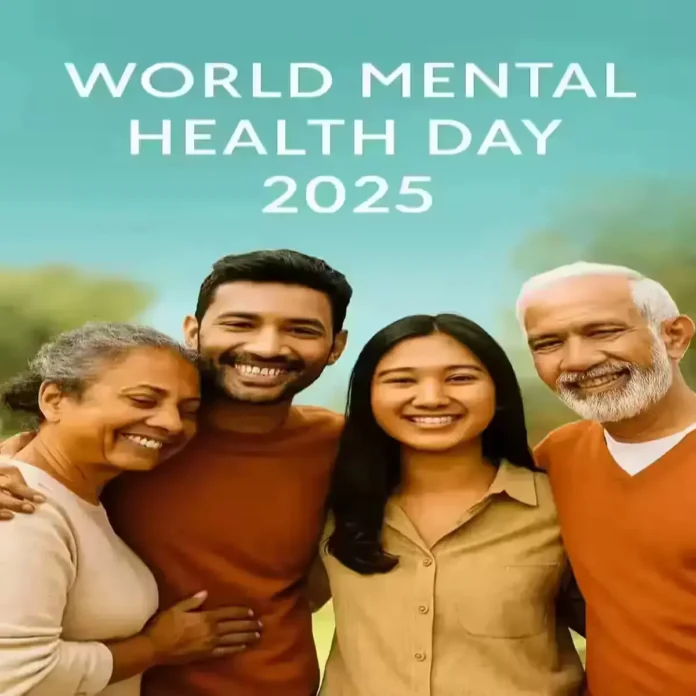World Mental Health Day 2025: Access to Care, Support, and Everyday Wellness
Every year, October 10 is observed as World Mental Health Day — a day that reminds us how mental well-being is as essential as physical health. For World Mental Health Day 2025, the theme focuses on ensuring access to mental health care, especially during emergencies and crises. From natural disasters to conflicts, people often face silent struggles that remain unseen. This global campaign urges everyone to recognize, support, and care for mental health at every stage of life.
Why World Mental Health Day 2025 Matters
The message this year is clear: no one should be left behind when it comes to mental health. Emergencies like wars, pandemics, or climate events affect both the body and mind. The goal is to build a system where help is always within reach — whether through digital counseling, community programs, or outreach clinics.
Understanding Mental Health Conditions
Mental health disorders cover a wide range of conditions such as anxiety, depression, post-traumatic stress disorder (PTSD), and bipolar disorder. During stressful times, these conditions can worsen. Recognizing early signs — like sleep disturbances, constant worry, or withdrawal — can help someone get the right help sooner.
“Psychiatry at Your Doorstep” – Bringing Care Closer

One initiative gaining attention is “Psychiatry at Your Doorstep”. The idea is simple but powerful — bring mental health services closer to where people live. This approach helps remove barriers such as travel, cost, and stigma. In many cities, teams of mental health professionals are visiting communities directly, offering screenings, counseling, and medication management at home. It’s a step toward normalizing mental health care as an essential part of everyday health.
How to Support Someone with Anxiety
Supporting someone struggling with anxiety doesn’t always require big gestures — often, it’s about being there in small, consistent ways. Here are a few tips to help:
- Listen without judgment. Allow them to share how they feel, even if you don’t fully understand it.
- Stay patient and calm. Avoid statements like “Just relax” or “Don’t worry.”
- Offer grounding activities — slow breathing, gentle movement, or mindful observation can help reduce anxiety in the moment.
- Encourage professional help when symptoms persist or affect daily functioning.
- Most importantly, remind them they’re not alone — support makes a real difference.
Simple Fitness and Health Tips for a Better Mind
Mental wellness is closely tied to physical health. Small lifestyle changes can improve mood and emotional balance:
- Exercise regularly — even short walks can reduce stress hormones.
- Eat balanced meals rich in fiber, protein, and healthy fats.
- Maintain consistent sleep patterns.
- Practice mindfulness or breathing exercises daily.
- Limit social media time and focus on in-person interactions.
Advantages and Challenges in Mental Health Awareness
Advantages: Greater awareness leads to early detection, better treatment outcomes, and a more empathetic society. It encourages open dialogue about topics once considered taboo.
Challenges: Stigma still exists in many cultures. Some people lack access to affordable care, and healthcare systems often face staff shortages. Building consistent, community-based solutions remains the biggest challenge ahead.
Advice for Everyone
If you’re feeling overwhelmed, remember that seeking help is a strength, not a weakness. Talk to someone you trust, reach out to a counselor, or contact a helpline in your area. Checking in with others — friends, family, or co-workers — can also create a ripple of support and understanding. Collective compassion builds stronger, healthier communities.
Disclaimer
This article is for informational purposes only. It is not a substitute for medical diagnosis or treatment. If you or someone you know is in crisis, contact a licensed mental health professional or local emergency services immediately.

Frequently Asked Questions (FAQ)
What is the theme of World Mental Health Day 2025?
The theme focuses on “Access to Services – Mental Health in Catastrophes and Emergencies.” It highlights the importance of ensuring mental health care even during crises.
What does “Psychiatry at Your Doorstep” mean?
It’s a program designed to bring psychiatric care directly to communities, helping people access mental health support without long waits or travel barriers.
How can I support someone with anxiety?
Listen with empathy, stay calm, encourage self-care practices like deep breathing, and help them connect with professional support when needed.
Why is physical fitness important for mental health?
Regular exercise, good sleep, and balanced nutrition improve mood, reduce stress, and support long-term emotional stability.
Is professional help always necessary?
While self-care helps manage mild stress or anxiety, professional guidance is essential when symptoms persist or disrupt daily life.

